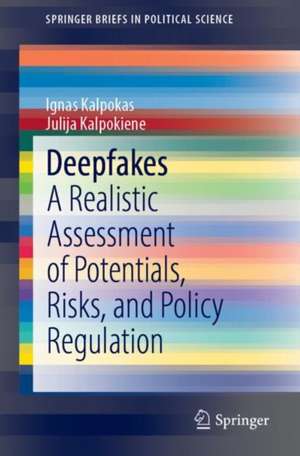Deepfakes: A Realistic Assessment of Potentials, Risks, and Policy Regulation: SpringerBriefs in Political Science
Autor Ignas Kalpokas, Julija Kalpokieneen Limba Engleză Paperback – 17 feb 2022
Hence, this book sets out to critically evaluate potential threats by analyzing human susceptibility to manipulation and using that as a backdrop for a discussion of actual and likely uses of deepfakes. In contrast to the usual threat narrative, this book will put forward a multi-sided picture of deepfakes, exploring their potential and that of adjacent technologies for creative use in domains ranging from film and advertisement to painting. The challenges posed by deepfakes are further evaluated with regard topresent or forthcoming legislation and other regulatory measures. Finally, deepfakes are placed within a broader cultural and philosophical context, focusing primarily on posthumanist thought.
Therefore, this book is a must-read for researchers, students, and practitioners of political science and other disciplines, interested in a better understanding of deepfakes.
Din seria SpringerBriefs in Political Science
-
 Preț: 410.94 lei
Preț: 410.94 lei -
 Preț: 259.57 lei
Preț: 259.57 lei -
 Preț: 375.62 lei
Preț: 375.62 lei -
 Preț: 478.53 lei
Preț: 478.53 lei -
 Preț: 411.16 lei
Preț: 411.16 lei -
 Preț: 379.48 lei
Preț: 379.48 lei -
 Preț: 226.22 lei
Preț: 226.22 lei -
 Preț: 378.71 lei
Preț: 378.71 lei -
 Preț: 342.25 lei
Preț: 342.25 lei -
 Preț: 379.48 lei
Preț: 379.48 lei -
 Preț: 443.58 lei
Preț: 443.58 lei -
 Preț: 125.07 lei
Preț: 125.07 lei -
 Preț: 358.32 lei
Preț: 358.32 lei -
 Preț: 475.65 lei
Preț: 475.65 lei -
 Preț: 379.48 lei
Preț: 379.48 lei -
 Preț: 375.84 lei
Preț: 375.84 lei -
 Preț: 378.54 lei
Preț: 378.54 lei -
 Preț: 342.84 lei
Preț: 342.84 lei -
 Preț: 379.68 lei
Preț: 379.68 lei -
 Preț: 309.04 lei
Preț: 309.04 lei - 15%
 Preț: 520.30 lei
Preț: 520.30 lei -
 Preț: 380.84 lei
Preț: 380.84 lei -
 Preț: 374.85 lei
Preț: 374.85 lei -
 Preț: 377.73 lei
Preț: 377.73 lei -
 Preț: 378.54 lei
Preț: 378.54 lei -
 Preț: 444.94 lei
Preț: 444.94 lei -
 Preț: 374.85 lei
Preț: 374.85 lei -
 Preț: 379.86 lei
Preț: 379.86 lei -
 Preț: 476.21 lei
Preț: 476.21 lei -
 Preț: 377.73 lei
Preț: 377.73 lei -
 Preț: 444.13 lei
Preț: 444.13 lei -
 Preț: 446.65 lei
Preț: 446.65 lei -
 Preț: 444.52 lei
Preț: 444.52 lei -
 Preț: 376.59 lei
Preț: 376.59 lei -
 Preț: 375.07 lei
Preț: 375.07 lei -
 Preț: 261.53 lei
Preț: 261.53 lei -
 Preț: 376.22 lei
Preț: 376.22 lei -
 Preț: 259.57 lei
Preț: 259.57 lei -
 Preț: 380.07 lei
Preț: 380.07 lei -
 Preț: 261.32 lei
Preț: 261.32 lei -
 Preț: 375.45 lei
Preț: 375.45 lei -
 Preț: 310.18 lei
Preț: 310.18 lei -
 Preț: 378.54 lei
Preț: 378.54 lei - 5%
 Preț: 356.11 lei
Preț: 356.11 lei -
 Preț: 477.34 lei
Preț: 477.34 lei -
 Preț: 343.72 lei
Preț: 343.72 lei - 15%
 Preț: 462.05 lei
Preț: 462.05 lei -
 Preț: 379.30 lei
Preț: 379.30 lei -
 Preț: 378.71 lei
Preț: 378.71 lei
Preț: 376.59 lei
Nou
Puncte Express: 565
Preț estimativ în valută:
72.07€ • 78.26$ • 60.54£
72.07€ • 78.26$ • 60.54£
Carte tipărită la comandă
Livrare economică 22 aprilie-06 mai
Preluare comenzi: 021 569.72.76
Specificații
ISBN-13: 9783030938017
ISBN-10: 3030938018
Pagini: 87
Ilustrații: V, 87 p.
Dimensiuni: 155 x 235 mm
Greutate: 0.15 kg
Ediția:1st ed. 2022
Editura: Springer International Publishing
Colecția Springer
Seria SpringerBriefs in Political Science
Locul publicării:Cham, Switzerland
ISBN-10: 3030938018
Pagini: 87
Ilustrații: V, 87 p.
Dimensiuni: 155 x 235 mm
Greutate: 0.15 kg
Ediția:1st ed. 2022
Editura: Springer International Publishing
Colecția Springer
Seria SpringerBriefs in Political Science
Locul publicării:Cham, Switzerland
Cuprins
Introduction.- Fake News and Disinformation: Where Are We Now?.- On Human Susceptibility: Assessing Potential Threats.- From GANs to Deepfakes: Getting the Characteristics Right.- On Alarmism: Between Infodemic and Epistemic Anarchy.- I CAN Do It: From GANs and Deepfakes to Art.- Regulation: Public, Private, Autonomous?.- Broader Implications: Politics and Digital Posthumanism.- Conclusion.
Notă biografică
Ignas Kalpokas is an Associate Professor at the Department of Public Communication at Vytautas Magnus University, Lithuania, and an Associate Professor of International Relations and Development at the Department of Social Sciences at LCC International University, Lithuania. His research focuses on Cyber Politics, Political Theory, Critical Theory, Social Media, Communication, and Big Data.
Julija Kalpokiene is a member of the Faculty of Law at Vytautas Magnus University, Lithuania, and a lawyer. Her research focuses on IP, Tech & Data protection law, as well as Cyberspace and internet regulation, AI, and data.
Textul de pe ultima copertă
This book examines the use and potential impact of deepfakes, a type of synthetic computer-generated media, primarily images and videos, capable of both creating artificial representations of non-existent individuals and showing actual individuals doing things they did not do. As such, deepfakes pose an obvious threat of manipulation and, unsurprisingly, have been the subject of a great deal of alarmism in both the news media and academic articles.
Hence, this book sets out to critically evaluate potential threats by analyzing human susceptibility to manipulation and using that as a backdrop for a discussion of actual and likely uses of deepfakes. In contrast to the usual threat narrative, this book will put forward a multi-sided picture of deepfakes, exploring their potential and that of adjacent technologies for creative use in domains ranging from film and advertisement to painting. The challenges posed by deepfakes are further evaluated with regard topresent or forthcoming legislation and other regulatory measures. Finally, deepfakes are placed within a broader cultural and philosophical context, focusing primarily on posthumanist thought.
Therefore, this book is a must-read for researchers, students, and practitioners of political science and other disciplines, interested in a better understanding of deepfakes.
Caracteristici
Critically evaluates potential threats by analyzing human susceptibility to manipulation Presents a multi-sided picture of deepfakes, exploring their potential for creative use Places deepfakes within a broader cultural and philosophical context
